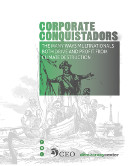Published on Fri, 2014-12-12 10:39
A new report released at COP20 by Corporate Europe Observatory, Democracy Center and Transnational Institute shows how corporations causing social and environmental destruction in the Andes and Amazon are driving climate change, whilst enjoying influential seats at the climate-negotiating table. The case studies included demonstrate how corporations from the global North operating in the extractives industry use well-honed practices of political manipulation while hiding their true nature through extravagant public relations campaigns which trumpet their disingenuous environmental credentials. The consequences of these corporations’ manipulation of decision-making processes include: the opening of new gas fields that destroy indigenous territories, the decimation of local water supplies and the forced displacement of whole communities. Yet in the midst of such exploitation the writers of the report have also witnessed brave acts of resistance by local communities. |
Published on Fri, 2014-12-12 09:10
China will remain as a developing country in the UNFCCC framework and will remain in the Like-minded Developing Countries group (LMDC) as well as the more general grouping of developing countries, according to the head of the Chinese delegation, Su Wei, taking part in the Conference of the Parties that opened in Lima on Monday. Su Wei made this confirmation in answer to a question during a side event on “Perspectives on the 2015 Paris deal: Options on the road from Lima to Paris” organised by the Third World Network and the South Centre at lunch time at the Conference Centre on the first day of the COP20. |
Published on Fri, 2014-12-12 07:20
In 2020, will 2014 seem like a turning point in the way the human rights system began to properly adapt to the challenges posed by the modern economy? In June this year the Human Rights Council passed a resolution establishing a new intergovernmental working group to establish a treaty to address corporate-related human rights violations. Before last week’s third UN Forum on Business and Human Rights a member of the pre-existing UN Working Group on Business & Human Rights – whose members have so far been silent on the June – is now supportive of the development of a treaty. |
Published on Fri, 2014-12-05 23:00
The principle of common but differentiated responsibilities (CBDR) is considered one of the key achievements of the UN Conference on Environment and Development in Rio de Janeiro in 1992. Twenty years later, this principle has become a focal point of current negotiations on climate change and the post-2015 agenda. The developing countries that make up the Group of 77 want to preserve the principle unchanged. However, the US, EU and other industrialized countries want to do away with it in its present form. They argue that global power structures have changed. In their view, fair burden sharing must include contributions to climate protection from emerging economies like China, India and Brazil. "If consensus cannot be found, there will be neither a new global climate treaty nor a global development agenda worthy of the name in 2015" writes Global Policy Forum's director, Jens Martens. |
Published on Fri, 2014-12-05 20:00
As part of the 16 Days Campaign Against Gender Based Violence (November 25 – December 10, 2014) AWID is honoring Feminists and Women Human Rights Defenders (WHRDs) Who Are No Longer With Us and whose contributions to the advancement of human rights are very much missed. Find out more here. |








